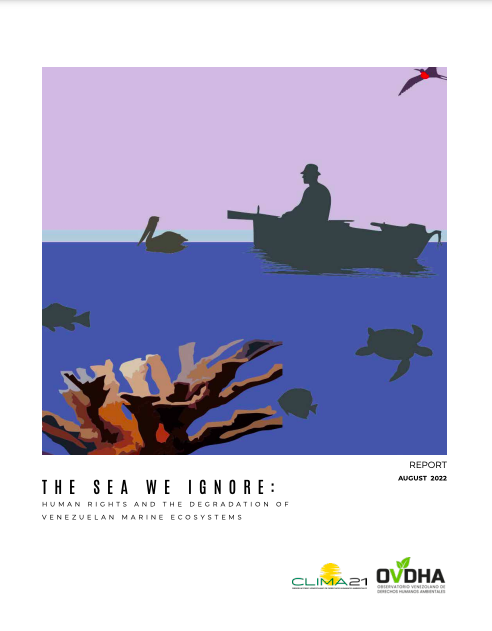
REPORT | Clima21: The sea we ignore: Human rights and the degradation of Venezuelan marine ecosystems
Clima21 | Venezuela | 10 de agosto de 2022
Informe
The extensive and heterogeneous continental coast of Venezuela and its islands on the Caribbean Sea present a very diverse natural and cultural heritage that generates a significant number of ecosystemic services and contributions to the country.
Despite this, the coastal marine ecosystems of the country are being subjected to multiple pressures of human origin that are causing their accelerated degradation. This process of deterioration is affecting the well-being and human rights of the Venezuelan population.
Based on this situation, this report seeks to contribute to the knowledge and understanding of the environmental situation of the different regions of the continental and insular coast of Venezuela. For this, 163 bibliographical references were reviewed, including scientific articles, reports, and documents, as well as articles published in the media.
The results obtained for the six zones into which the country’s coasts were divided were classified into environmental disturbances, threats to conservation, and obstacles.
The major disturbances include oil spills, contamination by sewage and solid waste, the presence of invasive species, and unsustainable extraction of biological diversity through fishing, hunting, or extraction from its habitat.
Likewise, the main threats are considered to include the effects of climate change on Venezuelan coastal ecosystems; the presence of heavy metals in the coastal areas of at least three areas of the country; the growing presence of microplastics in coastal sediments, and the absence of environmental considerations in the design of fishing and tourism policies.
The obstacles found in this review include the absence of environmental policies with technical criteria, the loss of professionals and specialists with skills to carry out environmental management tasks, the loss of institutional capacity for the management of protected areas, and the serious deterioration of Universities and other marine research centers.
With the information available, it is possible to state with some certainty that some of these disturbances are increasing over time while the damage also seems to increase and begin to affect areas and ecosystems where the disturbances were not previously present. It is also possible to affirm that the Venezuelan State lacks the capacities and the political will to prevent or mitigate these damages and their effects on the population.
All of these issues are major barriers to achieving the United Nations Sustainable Development Goals, including SDGs 1 (no poverty), 2 (zero hunger), 6 (clean water and sanitation), 8 (decent work and economic growth), 12 (responsible consumption and production), 13 (climate action), and 14 (life below water). Likewise, the results indicate that the country is not advancing towards any of the targets established for SDG14.
Based on the foregoing, a series of recommendations were addressed to the national government, including the development of a national policy for the conservation and sustainable use of coastal ecosystems; guarantees of compliance with the constitutional and legal norms for conservation of these areas; the inception of a policy for research on priority issues related to the Venezuelan sea; the design of a policy for the recovery of fishing activity; the promotion and support of marine education and research institutions and the cease of harassment and budgetary suffocation of national universities; the promotion of policies for participation and education on the conservation of the Venezuelan seas and coasts, and a call for companies -mainly the oil state-owned company PDVSA- to subscribe to the United Nations Sustainable Ocean Principles.
Click here to download the full report.